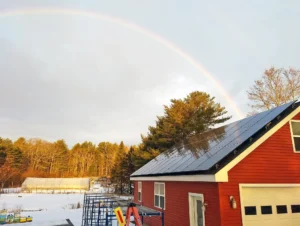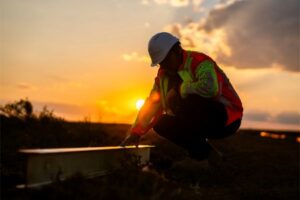ReVision Energy celebrates 21 years of getting it done for the little guys


A rainbow leads to a Revision Energy rooftop solar installation in Brunswick, Maine (courtesy: ReVision Energy)
Fortunat Mueller believes 2024 could be the year of the electric vehicle. At least, he hopes so. He’s been waiting a really long time for proper charging infrastructure.
“I’ve been driving an EV since I was in college, so about 25 years,” Mueller recalls.
If you’re doing some mental math and wondering how that’s possible, let me interrupt and confirm your suspicion- no, there wasn’t really an EV market in the United States around the turn of the century.
That didn’t matter much to Mueller, who is not the kind of guy who waits for someone else to present a solution. Instead, as part of an independent senior engineering project at Brown in 1999, Mueller built an electric powertrain and Frankensteined it into a donated 1988 Volkswagon Jetta. Take a gander at this eye-catcher:

“I mean, it was not very nice,” Mueller laughs when considering his creation. “But I was an undergrad!”
A lot has changed since those pre-Y2K days. Most of us are no longer unknowingly downloading viruses to our family computers on Napster and electric vehicles have started to gain mass market adoption. Mueller finished school, had himself a Hall of Fame-worthy Ultimate (frisbee) career, and before hanging up his disc, co-founded the 100% employee-owned solar company ReVision Energy, where he and more than 400 like-minded co-owners work toward building a just and equitable electric future.
He still drives an electric car, albeit one made in a factory. Mueller wonders: Is the rest of America finally ready to live in the EV-friendly world he was ready to step into when he pushed his foot down on that go-kart jalopy?
“We’re seeing a lot of federal funding for it now,” Mueller notes. This could be his year!
“I’m very excited to start seeing real charging infrastructure,” he re-confirms with the slightest of Rose on the Titanic vibes.

Power to the people
ReVision Energy, which has offices in Maine, New Hampshire, and Massachusetts, has constructed nearly 20,000 solar installations across the Northeastern United States. The company turns 21 years old this year.
Perhaps a celebratory sudsy beverage is in order?
“We had a few beers, yeah,” jokes Mueller.
Outside of happy hours, ReVision builds sub-utility scale solar, usually maxing out at around 7 or 8 MW. They do a lot of residential, community, and commercial projects in addition to constructing charging infrastructure and some energy storage and heat pumps. Not the kind of big money, no whammies stuff that makes for eye-catching headlines, but the sort of work that makes a real, tangible difference in communities.

“We basically work with our residential customers to eliminate fossil fuels entirely from their lives,” ReVision’s president and co-founder beams. “We think that’s what’s going to happen to the whole economy, and we think homeowners should go first.”
That includes people who can’t install solar panels on their homes or businesses; a common roadblock for renters, condo owners, and those with irregular roofs in the Northeastern United States. ReVision’s Community Solar Farms (CSFs) promise residents of Maine and New Hampshire the full benefits of solar, regardless of their ability to put panels up, by buying shares in a solar farm constructed elsewhere.
“[Our model] tries to replicate the value proposition of rooftop solar as closely as possible for customers,” Mueller explains. “Customers actually buy and own a share of a community solar project.”
He prefers his company’s shared ownership model to the more common community solar subscription.

“I think of it as a difference between renting an apartment and owning a condo,” Mueller contends. “To some degree, it feels the same. You’ve got a place to live.”
But in the subscription model, Mueller argues, “There’s some savings on your electric bill, but you never own the thing. You basically trade one bill for a slightly lower bill. In our model, you are ultimately eliminating your electric bill- though you do have to make the capital investment.”
Most of ReVision Energy’s customers finance their projects with loans, conducting a similar sort of bill swap- an electric bill for a (hopefully) smaller loan payment.
“But unlike the subscription, the loan payment eventually goes away,” reminds Mueller. “And then you end up with the full benefit of the solar.”
ReVision is working to ensure clean energy is available to a broad group of customers, from championing solar projects in low-to-moderate-income (LMI) communities like a resident-owned mobile home park in New Hampshire, to supporting refugees and immigrants via solar-powered refrigeration.

The company’s co-owners also assist disadvantaged groups with writing grant proposals to fund LMI projects and ReVision advocates for legislation that makes LMI solar projects more accessible.
To Mueller, it’s all worth it. He recognizes distributed and rooftop solar as keystones of the clean energy transition.
“We’re not gonna build that much transmission and distribution,” ReVision’s president predicts. “We need a mix of small solar and big solar to get where we’re going.”
Generating the next generation
To get wherever we’re going- and hopefully, it’s not in the backseat of that Volskwagon Jetta- the renewable energy industry will have to overcome some major hurdles.
“The workforce and interconnection feel, to me, like the two biggest constraints,” Mueller points out.
If interconnection peaks your interest, I’ve got a mid-article advertisement for you!
The interconnection event GridTECH Connect Forum encourages collaboration between project developers, utilities, grid operators, regulators, and policymakers. Together, we can improve the state of interconnection and put more renewable energy onto the grid. Join us for our next event at the Hyatt Regency in Newport Beach, California June 24-26. Registration is now open!
If the state of our engineering workforce is more of a concern, read on, because ReVision is chipping away at that.
What started as an electrical apprenticeship program for half a dozen people in New Hampshire has since grown into the ReVision Energy Training Center, a multi-state endeavor encompassing apprenticeships in manager training, technical sales, engineering design, and customer service. The center provides pathways to employment for immigrants, refugees, women, and other underrepresented populations via one-to-three-year-long programs.
“Prior to our program, we were sending a whole bunch of our co-owners to community college, nights and weekends, to go do this,” ReVision’s president reveals.
“We decided it would be better for them and better for us if we did it ourselves. We can control the schedule, we can control the content, we can make it more relevant, and we can make it a benefit for people who come to work at ReVision. You start as an apprentice and in a couple of years, you’ll have a license.”
Since 2018, more than 80 ReVision Energy co-owners have enrolled in apprenticeship programs and there are about 70 people in the program right now.
ReVision’s president says there are a couple hundred electricians currently working for the company, and he wants to keep a pipeline open.
“We recognize licensed electricians as one of the biggest bottlenecks to the clean energy transition over the next 20-25 years,” predicts Mueller. “If you look at the demographics of the people who are in the trades, they are overwhelmingly in their 50s and overwhelmingly white men,” he adds. “And for every new electrician that is licensed, two or three are retiring.”
Data backs up that assertion. Per at least one report, the United States must recruit, educate, and train at least one million new electricians within the next decade to install solar panels and EV charging infrastructure necessary to meet its climate goals.
Mueller says the program has already paid dividends for ReVision. He shouts out Josh Baston, who started with the company as a solar hot water installer more than a decade ago. He enrolled in the training center, got his electrician’s license, and now has a much larger responsibility.
“Anyway, he now runs the construction group for our EV charging business,” Mueller boasts. “And he was actually just appointed to the main state electrical license board, like as one of three people who makes the rules for licenses and electricians… Now he’s running the show for the whole state.”
More recently, ReVision started working further upstream in pre-apprenticeship, extending resources to people who may have been historically overlooked in the trades and partnering with immigrants (many asylum-seeking). ReVision’s co-owners spend 40 hands-on hours with participants, providing an introduction to clean energy and solar, helping them get an OSHA 10 card, and assisting with job applications at ReVision and competitors. The first cohort graduated from the pre-apprenticeship program last year.
“To accomplish our mission it takes a lot of excellent people and the best thing we can do is sort of train our own,” Mueller concludes. “That’s been really awesome and a pretty satisfying bit of work.”
Fortunat Mueller’s Ultimate Hall of Fame page (oh no, dear reader, I did not forget about that little nugget) calls him one of the best players in the sport in the ’00s. He was a guy who found success at every level while simultaneously earning the respect of his competition. Just read a snippet of this gleaming entry:
“Fortunat served as a captain or team leader on nearly every team he played for. Not prone to fiery speeches, Fortunat inspired his teammates through his work ethic at every practice and an infectious confidence. Throughout his career, Fortunat was regarded as a tough competitor, but also a fair one.”
– Ultimate Hall of Fame entry for Fortunat Mueller
The page paints a pretty clear portrait of the man behind the disc. It comes into sharper focus when you consider his last quarter century: the homemade electric car, founding a renewable energy company, the focus on community solar, seeking to provide equitable access to renewables, and the training center.
This is a guy who really, actually, totally believes the things he’s saying and in the work he’s doing. He’s not going to wait for an EV to come to market, for more transmission development, or for someone else to train the next generation of engineers. He and his co-owners will do it themselves, even if it means blazing new trails and getting their hands dirty.
And if you ever need a guy to catch the heck out of a flying disc, you know where to find him- if he’s not driving around looking for a place to charge.





